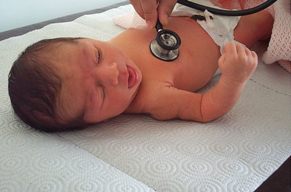 Pertussis, more commonly known as whooping cough, is a very contagious disease. Pertussis is caused by a germ that lives in the mouth, nose, and throat. It is spread to others through coughing or sneezing.
Pertussis, more commonly known as whooping cough, is a very contagious disease. Pertussis is caused by a germ that lives in the mouth, nose, and throat. It is spread to others through coughing or sneezing.
Q. Who gets pertussis?
A. Pertussis can occur at any age. Severe illness is more common in young children who have not been immunized. Older immunized children or adults with pertussis have milder symptoms. The diagnosis of pertussis should be considered for older children or adults with persistent coughs to ensure they do not pass the infection on to young children.
Q. How is pertussis spread?
A. Pertussis is primarily spread by direct contact with discharges from the nose and throat of infected individuals. Frequently, older siblings who may be harboring the bacteria in their nose and throat can bring the disease home and infect an infant in the household.
Q. What are the symptoms of pertussis?
A. Pertussis begins as a mild upper respiratory infection. Initially, symptoms resemble those of a common cold, including sneezing, runny nose, low-grade fever and a mild cough. Within two weeks, the cough becomes more severe and is characterized by episodes of numerous rapid coughs followed by a crowing or high pitched whoop. A thick, clear mucous may be discharged. These episodes may recur for one to two months, and are more frequent at night. Older people or partially immunized children generally have milder symptoms.
Q. How soon after infection do symptoms appear?
A. The incubation period is usually five to 10 days but may be as long as 21 days.
Q. When and for how long is a person able to spread pertussis?
A. A person can transmit pertussis from onset of symptoms to three weeks after the onset of coughing episodes. The period of communicability is reduced to five days after antibiotic therapy is begun.
Q. Does past infection with pertussis make a person immune?
A. One attack usually confers prolonged immunity.
Q. What are the complications associated with pertussis?
A. Complications of pertussis may include pneumonia, middle ear infection, loss of appetite, dehydration, seizures, encephalopathy (disorders of the brain), apneic episodes (brief cessation of breathing) and death.
Q. What is the vaccine for pertussis?
A. The vaccine for pertussis is usually given in combination with diphtheria and tetanus. Immunization authorities recommend that DTaP (diphtheria, tetanus, acellular pertussis) vaccine be given at two, four, six and 15-18 months of age and between four and six years of age. As of 2012, all adults are recommended to get the Tdap vaccine if they have not previously received it. Tdap should also be given to all unvaccinated pregnant women, preferably after 20 weeks gestation, to help protect their newborns from pertussis.
Q. What can be done to prevent the spread of pertussis?
A. The single most effective control measure is maintaining the highest possible level of immunization in the community. Treatment of cases with certain antibiotics such as erythromycin can shorten the contagious period. People who have or may have pertussis should stay away from young children and infants until properly treated. Treatment of people who are close contacts of pertussis cases is also an important part of prevention.
For more information about pertussis, see the following resources:
- Causes, symptoms, treatment (CDC)
- Pertussis Fact Sheet: English Spanish
- Immunizations Schedules (CDC)
